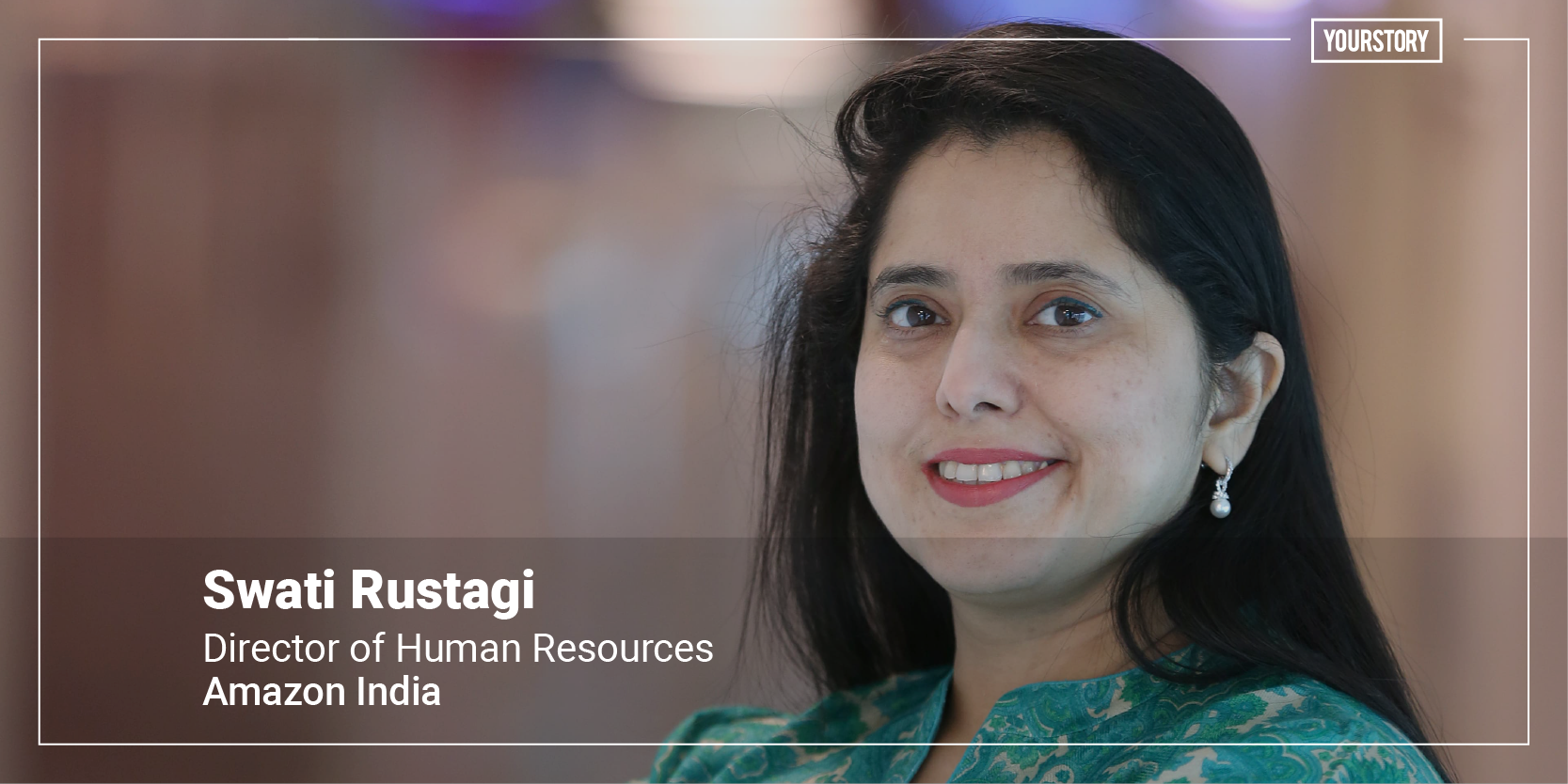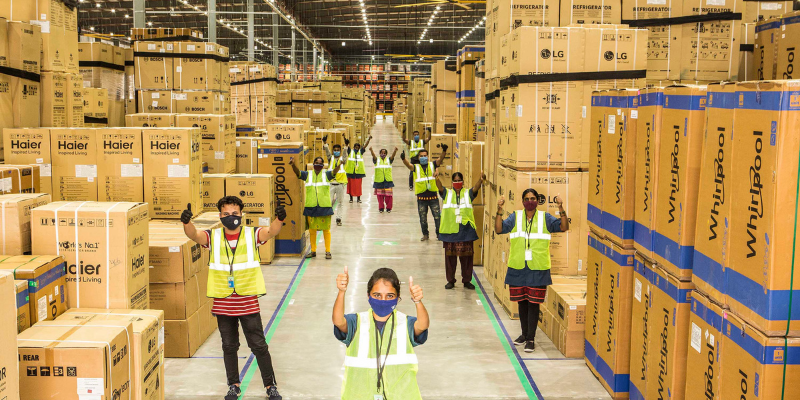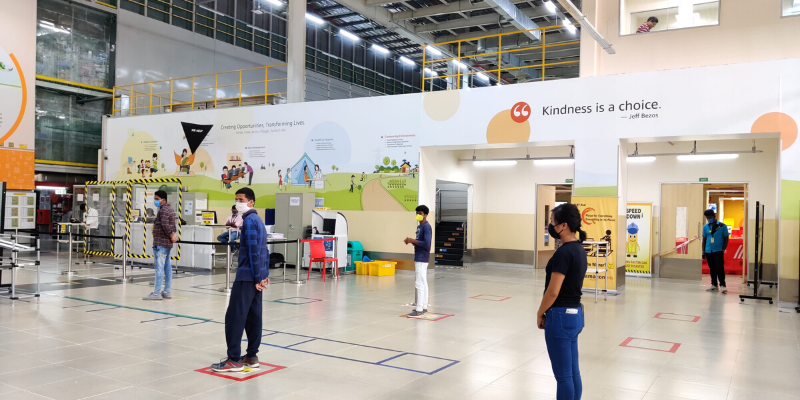Ecommerce giant Amazon, which grew its workforce to more than 1.3 million people in 2020, has embarked on a massive hiring push, with plans to hire 55,000 employees for corporate and technology roles.
Chief Executive Andy Jassy recently announced that over 40,000 of these jobs will be in the US, and the others will be in India, Germany, and Japan.
Amazon, which strives to be Earth’s most customer-centric company, has big plans for India, including making the workforce more diverse and inclusive. This would mean increased participation from women, people with learning disabilities, and the LGBTQI community.
In a conversation with YourStory, Swati Rustagi, Director of Human Resources, Amazon India Operations, says it wants to create an impact at scale and, in the process, enable an environment that their associates, especially at the field level, get the respect they deserve from society.
“This will ensure that our workforce will always put customer needs first,” she says.
Swati says Amazon wants to create an ecosystem of growth for all its employees, and is keen to “fuel their dreams and aspirations”. To create impact at scale, the company is increasing focus on inclusive initiatives to bring women, people with disabilities, those from the LGBTQI community, and military veterans into the fold.
Swati says this hiring push needs a multi-pronged approach and Amazon India has created specific programmes for each of these segments to ensure “employment opportunity for all”. For the first time, the company is also bringing Amazon Career Day, a virtual event for those seeking employment opportunities at the company, to India.

Edited excerpts from the interview:
YourStory: How do you view your role as the director of Human Resources at Amazon India?
Swati Rustagi: Two things stand out for me and the team at Amazon. First, we always worked backwards – we start from the level of our associates; they always come first. There are very few organisations across the world that would be bold enough to ensure that an approach to benefits starts from the associates. It does not matter what level – whether that person is a contract labour or any other personnel.
This approach really came alive when Covid hit us. We started to think about how are we were going to deal with people unable to come to work, small and medium businesses that depended on us as their livelihoods were directly impacted.

The specialised fulfilment centre of Amazon India
We came up with multiple interventions such as Amazon Relief Fund, which helped support truck drivers. They are probably not directly employed by Amazon, but it did not matter as they are human beings. We did this because this is our ecosystem and we needed to protect it. The same was extended to delivery partners. If someone contracted COVID, they could apply for assistance from the relief fund. We also offered subsistence allowance to individuals whose incomes were significantly impacted.
The second wave tested us further. We thought about how to create an ecosystem to help as there was a breakdown of entire system. How does one help – be it when it comes to mental, financial, health issues etc. We did not differentiate in any type of workforce that reached out to us during that time.
We created a system that guided our associates to reach out to the right resources. We did the same with our efforts towards vaccinating our ecosystem of employees, partners, and associates.
YS: What steps is Amazon India taking towards building an inclusive organisation?
SR: As an organisation, we are constantly identifying under-represented cohorts in the workplace and how we can create a mechanism to convince them to work for us, whether it is the LGBTQI community or people with disabilities. Today, we hear stories from these communities, of people who have gone back to their parents to show that they are earning.
We get numerous communication from people seeking opportunities to work with Amazon. For example, we working along with governments to look at how can we put in place an all-women drivers’ network in cities; this requires several interventions.
We also have a programme to engage with people with learning disabilities and make them full-time employees. We have also created a virtual work environment, especially for women, and offer the flexibility of choosing their working times. The opportunity here is to create impact at scale.
YS: Could you tell us more about initiatives like these?
SR: There are multiple programmes to increase the participation of women in the workforce.
At Amazon India, whenever a senior leader visits a site, the first thing they do is to meet the women there and get their feedback. We have worked very closely with various state governments to get approvals for women to work night shifts where we make sure that the aspect of safety is taken care of.
This gives them the freedom of choice when it comes to working options. We have big aspirations and ambitions on hiring women delivery partners.
Amazon India has also done pilot projects with the transgender community; these took efforts from both sides. This is about people accepting how to make sure every transgender is respected and cared for within the community.
We provide a mechanism, where they can work in an all-transgender community or an inclusive work environment if they are comfortable.

Amazon India employees
Similarly, we have done significant work with people with disabilities. We have virtual interpreters at our sites for the speech and hearing impaired.
The military veterans' programme has worked very well for us, with many wanting to join our workforce. There are also efforts to get those people who have taken long breaks back into the workforce.
YS: What is the idea behind Amazon Career Day?
SR: This is the first time that we are getting Amazon Career Day to India. This is to introduce Amazon to individuals who might have heard about or read about the company but had no active engagement.
This forum aims to help open our doors to people — they can ask anything, and we can help and coach them. Most importantly, they can learn about the different kinds of opportunities that Amazon offers. Amazon Career Day aims to make us accessible. This will reveal how we hire people, what we look for, who to go to etc.
YS: What will be some of Amazon India’s initiatives, going forward?
SR: The COVID-19 pandemic showed the determination of our people to come back to work as the ecommerce industry had a critical role to play in this environment. Our next step is to figure out and ensure that this workforce gets its due respect in society; that is our mission.
How do you create that feeling within the community that it is not just a financial transaction? How do you ensure that society is supportive of these individuals?
Our focus is to create an ecosystem of growth for these individuals. A person can start as a driver but later become a delivery partner. This involves training and coaching, and we make sure that we fuel their dreams and aspirations.
The next focus area will be mental wellness, which is very important for us. We want to drive home the message that it is okay to ask for help. At Amazon, we are there not just for our customers but also for our people.
YourStory’s flagship startup-tech and leadership conference will return virtually for its 13th edition on October 25-30, 2021. Sign up for updates on TechSparks or to express your interest in partnerships and speaker opportunities here.
For more on TechSparks 2021, click here.
Edited by Teja Lele Desai
Link : https://yourstory.com/2021/09/amazon-india-creating-inclusive-environment-workforce
Author :- Thimmaya Poojary ( )
September 17, 2021 at 06:55AM
YourStory
